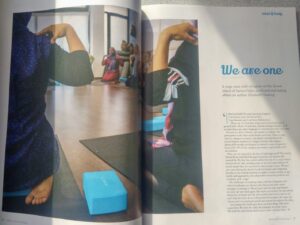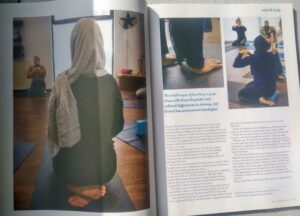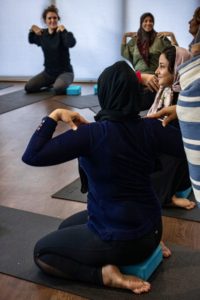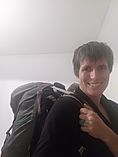WE ARE ONE
A yoga class with refugees on the Greek island of Samos had a profound and lasting effect on author Elizabeth Gowing
This article was published in Planet Mindful Magazine (UK) in January 2020


‘PHOTOGRAPHS: ELINE VAN OSSTERHOUT
I am Elizabeth and I am from England,’
‘I am Fatime and I am from Syria’.
‘I am Mariam and I am from Afghanistan’.
There are 15 of us here today and each introduction is greeted with a flurry of welcome, furious waving of hands… as if we don’t have any other language to communicate with each other.
Because we don’t. Demet, our teacher, is Turkish. The participants in the class speak Arabic and Farsi. This is a yoga class for refugees on Samos, the island currently facing the second highest numbers of refugee arrivals in the Aegean. About 6000 people are living in or around a camp designed to house 650; 24% per cent of the refugees are women, and a further 36% per cent are children.
How can we respond in the face of such huge need? The charity Glocal Roots identified the gap in provision for women and opened the We Are One center earlier this year. It’s a space where women can be safe, avoiding some of the fears and incidents of sexual assault that are reported in the refugee camps. Women can come during the day for food, for English and computing lessons, to use sewing machines to make or repair clothes, to get health and legal advice, free disposable menstrual products and condoms, and…yoga!
 The challenges of teaching a class with these linguistic and cultural challenges are obvious, but Demet has some smart strategies to manage it. We go into Cat-Cow pose and miaow; we moo our way back again. She wants us to notice the placement of her feet or hands and she drums with them on her mat so we can’t help but look. As we roll up from Uttanasana she sings out ‘sloooooow’ in a particular pitch that repeats throughout the class.
The challenges of teaching a class with these linguistic and cultural challenges are obvious, but Demet has some smart strategies to manage it. We go into Cat-Cow pose and miaow; we moo our way back again. She wants us to notice the placement of her feet or hands and she drums with them on her mat so we can’t help but look. As we roll up from Uttanasana she sings out ‘sloooooow’ in a particular pitch that repeats throughout the class.
And despite the challenges there are some things that seem easier here. We start the class, for example, in a deep squat. We hold the pose for an entire music track – perhaps three minutes. Demet directs us to sway from side to side, to clap, to chant. Like a drone below the singing there is lactic acid screaming along my thighs; my hip flexors are jangling. This is not a beginners’ yoga pose – it’s the sort that my London yoga teacher would build up to over a class or a series of classes, and apologise to us before she suggested it. But the Middle Eastern and African women around the room here look as comfortable as if they were at home on a couch.
With similar cultural awareness, in Triangle pose, Demet has us circling our upper hand in the air as if we’re twirling a handkerchief in Oriental dance, and the women make enthusiastically celebratory gestures, channeling memories of partying back home.
But her most powerful cultural messages come at the end. We’re brought into a circle, holding hands, and she gestures at our arms – the brown and beige and tan and cream.
‘We might look different,’ she gestures. ‘But we are not different in our hearts. We are one!’ She repeats it – WE ARE ONE! – and we chant along, and she starts jumping once per syllable, and we all join in, our voices getting louder; and to my intense awkwardness I discover I have tears in my eyes.
 The other women seem similarly moved. Afterwards I speak to some of them. Amal is an 18 year-old from Somalia and she says the first time she heard of yoga was at the We Are One centre.
The other women seem similarly moved. Afterwards I speak to some of them. Amal is an 18 year-old from Somalia and she says the first time she heard of yoga was at the We Are One centre.
‘Now, when I’m tired I go to yoga and I’m happy. When I’m sad I go to yoga and I’m happy,’ she says simply. ‘Yoga gives me power and it gives me energy. Before, when I woke up in the camp I felt tired.’
Tayebe and Mariam are from Afghanistan. They’ve practiced yoga in a class with one of the centre’s other teachers, Kelly. Tayebe says she does it because ‘after yoga I get on better with my sons’ – she has boys aged nine and four. ‘I don’t get angry.’
Mariam says ‘We have a lot of problems in the camp, and here we can forget them. After yoga we feel free and happy.’ ‘Problems’ sounds like a euphemism to me, remembering that this is the camp whose infestations of rats and snakes were recently reported in the New York Times.
The next time I settle down to my yoga practice back home in England; the next time I worry about having the right leggings to wear or whether I can keep my balance in Dancer, I’m going to remember Amal and Demet, Mariam, Tayebe and Kelly, and their wisdom about what yoga is really about: Its power and its energy; the freedom and the happiness it offers; the Sanskrit word suggesting the ‘yoking’ that connects us all together; the celebration of all that we have in common in our hearts. That We Are One!
If you would like to help support the centre, visit glocalroots.org

Elizabeth Gowing
Elizabeth Gowing is the author of Unlikely Positions in Unlikely Places: a yoga journey around Britain, published in 2019.







